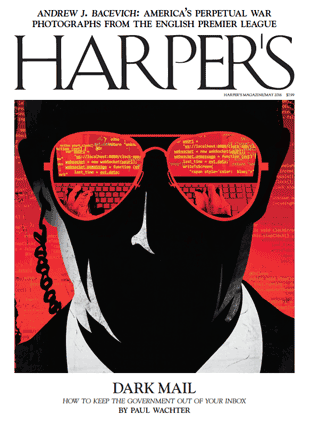Inside the May Issue
Rebecca Solnit, Andrew J. Bacevich, Samuel James, Elisabeth Zerofsky, Paul Wachter, and more
 Programmers have long tried to protect users from government spying by developing encryption services that even their creators can’t break. Years before Apple refused to grant the FBI the ability to bypass the iPhone’s lock screen, Ladar Levison built Lavabit, an encrypted-email service used by Edward Snowden, among others. When the FBI sought Levison’s help in accessing Snowden’s account, he shut down the service entirely, making him a hero to privacy advocates and the hacker community. Paul Wachter meets with Levison in New York and Texas to discuss his latest project, Dark Mail. Levison addresses the government in the opening pages of an early release of Dark Mail’s code: “For better or worse, good or evil, what follows would not have been created without you.”
Programmers have long tried to protect users from government spying by developing encryption services that even their creators can’t break. Years before Apple refused to grant the FBI the ability to bypass the iPhone’s lock screen, Ladar Levison built Lavabit, an encrypted-email service used by Edward Snowden, among others. When the FBI sought Levison’s help in accessing Snowden’s account, he shut down the service entirely, making him a hero to privacy advocates and the hacker community. Paul Wachter meets with Levison in New York and Texas to discuss his latest project, Dark Mail. Levison addresses the government in the opening pages of an early release of Dark Mail’s code: “For better or worse, good or evil, what follows would not have been created without you.”
A week after the Paris attacks in November, Elisabeth Zerofsky traveled to France to report on the rise of Marine Le Pen and her far-right National Front party. The last six months have been crucial for the party: many of their policies are finally being taken up by mainstream politicians in the name of greater national security. Zerofsky interviews Le Pen at her office in Strasbourg and follows her as she campaigns for National Front candidates in France’s regional elections. After a rally in Hayange, the northeastern town that recently elected a National Front mayor, Zerofsky speaks to a third-generation Algerian merchant who fears that the group’s xenophobic plans to close the country’s borders are as absurd as its promises to revive industrial areas. “The thing is, this ‘France for the French,’” he told her, “it doesn’t exist.”
Accompanying Zerofsky’s letter is an excerpt from XXI’s reported photo-essay about Hayange. Through the words of Hayange’s residents, Vincent Jarousseau and Valérie Igounet illustrate what a France led by the National Front might look like.
In an essay about the failures of U.S. foreign policy, military historian Andrew J. Bacevich explains that the government’s current military policy has its roots in a “tunnel vision” view of the past. This narrow history, Bacevich writes, “affirms certain propositions that are dear to American hearts, preeminently the conviction that history itself has summoned the United States to create a global order based on its own self-image.” From the War for Pacific Dominion to ongoing interventions in the Greater Middle East, Bacevich argues that the United States has risked the “danger of allowing moral self-delusion to compromise political judgment.”
In her Easy Chair column, Rebecca Solnit reflects on a different sort of political bad faith: the “naïve cynicism” of the left that “bleeds the sense of possibility.” Writing about the cynics who’ve given up on Occupy and climate change, Solnit explains that we should instead strive for an attitude of “acceptance that whatever takes place will usually be a mixture of blessings and curses.”
Also in this issue: photographer Samuel James documents English Premier League soccer and the title race between Leicester City and Tottenham Hotspur; new fiction by Vince Passaro; Christine Smallwood on C. E. Morgan’s The Sport of Kings, Polaroid photography, and Teffi, the great chronicler of Revolutionary Russia; Elaine Blair discusses the sophistic vanity of lyric essayists; and Christopher Beha on the literary theodicy of Annie Dillard.


